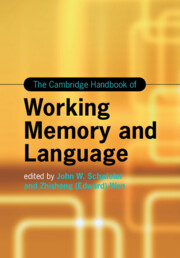Book contents
- The Cambridge Handbook of Working Memory and Language
- Cambridge Handbooks in Language and Linguistics
- The Cambridge Handbook of Working Memory and Language
- Copyright page
- Contents
- Figures
- Tables
- About the Editors
- About the Contributors
- Acknowledgments
- Overview of the Handbook
- Part I Introduction
- Part II Models and Measures
- Part III Linguistic Theories and Frameworks
- Part IV First Language Processing
- Part V Bilingual Acquisition and Processing
- 24 How Measures of Working Memory Relate to L2 Vocabulary
- 25 Working Memory and L2 Grammar Development in Children
- 26 Working Memory and L2 Grammar Learning among Adults
- 27 Working Memory and L2 Sentence Processing
- 28 Methodological Issues in Research on Working Memory and L2 Reading Comprehension
- 29 Working Memory and Second Language Speaking Tasks
- 30 Working Memory in Second Language Interaction
- 31 Working Memory and Interpreting Studies
- 32 A Methodological Synthesis of Working Memory Tasks in L2 Research
- Part VI Language Disorders, Interventions, and Instruction
- Part VII Conclusion
- Index
- References
26 - Working Memory and L2 Grammar Learning among Adults
from Part V - Bilingual Acquisition and Processing
Published online by Cambridge University Press: 08 July 2022
- The Cambridge Handbook of Working Memory and Language
- Cambridge Handbooks in Language and Linguistics
- The Cambridge Handbook of Working Memory and Language
- Copyright page
- Contents
- Figures
- Tables
- About the Editors
- About the Contributors
- Acknowledgments
- Overview of the Handbook
- Part I Introduction
- Part II Models and Measures
- Part III Linguistic Theories and Frameworks
- Part IV First Language Processing
- Part V Bilingual Acquisition and Processing
- 24 How Measures of Working Memory Relate to L2 Vocabulary
- 25 Working Memory and L2 Grammar Development in Children
- 26 Working Memory and L2 Grammar Learning among Adults
- 27 Working Memory and L2 Sentence Processing
- 28 Methodological Issues in Research on Working Memory and L2 Reading Comprehension
- 29 Working Memory and Second Language Speaking Tasks
- 30 Working Memory in Second Language Interaction
- 31 Working Memory and Interpreting Studies
- 32 A Methodological Synthesis of Working Memory Tasks in L2 Research
- Part VI Language Disorders, Interventions, and Instruction
- Part VII Conclusion
- Index
- References
Summary
This chapter explores the dynamic relationship between working memory (WM) and grammar development across adult L2 learning. For over twenty years, WM has received considerable attention in research on adult second language (L2) development. One reason for this is that L2 learning requires both processing and storage to comprehend input and to extract intake for acquisition, so differences in WM capacity may explain differences in developmental rates. Most studies on WM and morphosyntactic development in adults support the “more is better” hypothesis (Miyake & Friedman, 1998); yet others did not yield evidence in its support (e.g., Foote, 2011; Grey, Cox et al., 2015). While linguistic targets and methods may explain many discrepancies, recent research (e.g., Serafini & Sanz, 2016) may also help us understand these differences as a reflection of changes in what constitutes a cognitively demanding task (i.e., what tasks recruit WM resources) across L2 learning
Information
- Type
- Chapter
- Information
- The Cambridge Handbook of Working Memory and Language , pp. 573 - 592Publisher: Cambridge University PressPrint publication year: 2022
References
Accessibility standard: Unknown
Why this information is here
This section outlines the accessibility features of this content - including support for screen readers, full keyboard navigation and high-contrast display options. This may not be relevant for you.Accessibility Information
- 1
- Cited by
